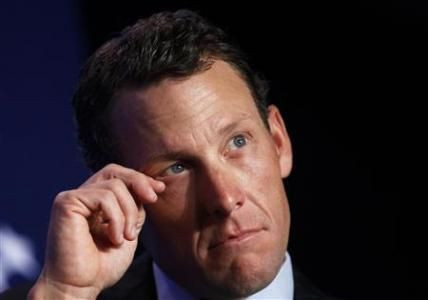Lance Armstrong’s Confession To Oprah Winfrey Not Enough, Say US, World Doping Agency

Lance Armstrong’s years of doping denial are over after he confessed in an interview (yet to air) with Oprah Winfrey. But with pending federal and world doping sanctions, the troubles of the world's most famous and infamous cyclist may be just starting.
Armstrong finally admitted that he was, in fact, doping as he won seven Tour de France titles in an interview that will air on Winfrey’s OWN channel Thursday and Friday. While we do not know the full extent of the interview yet, Winfrey did confirm that Armstrong admitted to doping throughout his career.
In the wake of his confession, the disgraced cyclist still has to answer some very serious questions. During Armstrong’s comeback from testicular cancer, he raced as part of the team sponsored by the United States Postal Service, a government entity. From 1999 until 2004, Armstrong was sponsored by the USPS and he went on to win six consecutive Tour de France titles, adding a seventh in 2005 when he was sponsored by Discovery.
Part of Armstrong’s contract with USPS was a strict anti-doping policy, reports CBS News. He was served with a lifetime ban by the United States Anti-Doping Agency in 2012 and stripped of all his titles. Armstrong had maintained his innocence following the ruling but now with the interview with Oprah, it is clear that Armstrong committed criminal fraud.
Armstrong tried to reach an agreement with the federal government, offering $5 million as a way to compensate for the $30 million USPS sponsorship deal and to turn witness for a federal doping investigation, reports CBS News. Both overtures were rebuffed by the government. It is unclear what penalties Armstrong would face if the government decided to pursue a fraud case.
As outlined by the USADA and his teammates, Armstrong was the mastermind behind a very sophisticated doping ring that involved scores of people. Armstrong’s doping went beyond just performance enhancing drugs and included blood doping. Tyler Hamilton, a former teammate, discussed Armstrong’s doping on “60 Minutes Sports,” notes CBS News, saying, “Blood doping, for example, took a lot of money, a lot of details, a posse of sophisticated, you know, know-what-they're-doing kind of people. And Lance had those.”
While a federal case could happen, any discussion of Armstrong’s lifetime ban needs to begin with a confession under oath, not just on TV, reports The Associated Press. Another former teammate, Frankie Andreu, told the AP: “He's the one who knows who did what because he was the ringleader. It's up to him how much he wants to expose.”
Even though Armstrong is willing to discuss possible names with the USADA, the World Anti-Doping Agency first wants a full confession under oath, reports AP. Armstrong could be facing at least three lawsuits stemming from his doping. Floyd Landis, another tainted former Tour de France winner, set up the whistleblower lawsuit that could force Armstrong to return sponsorship money as well as other financial penalties.
The other lawsuits stem from Armstrong’s adamant doping denials. The Sunday Times of London lost a libel suit against Armstrong and is looking to reclaim the $500,000 it had to pay him, reports AP. SCA Promotions, which sponsored Armstrong, could be looking to recoup up to $7.5 million as part of a bonus given him for winning the Tour de France.
South Australia’s government is also looking for Armstrong to return millions of dollars he collected as part of appearance fees for competing in the Tour Down Under in 2009, 2010 and 2011.
Speaking about the Armstrong interview, Oprah told “CBS This Morning,” “We were mesmerized and riveted by some of his answers. I feel that he answered the questions in a way that he was ready." She also describes Armstrong getting emotional during certain parts of the interview.
While Armstrong has already gotten a lifetime ban, been stripped of his Tour de France titles and had to quit his Livestrong Foundation, it is only the beginning of the discussion about cycling and doping. Considering all the people involved, as well as the many people who have been caught doping, expect cycling to be in the news, again thanks to Armstrong, but this time for all the wrong reasons.
© Copyright IBTimes 2025. All rights reserved.






















